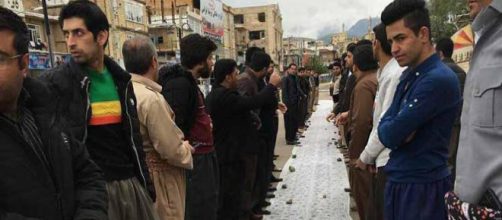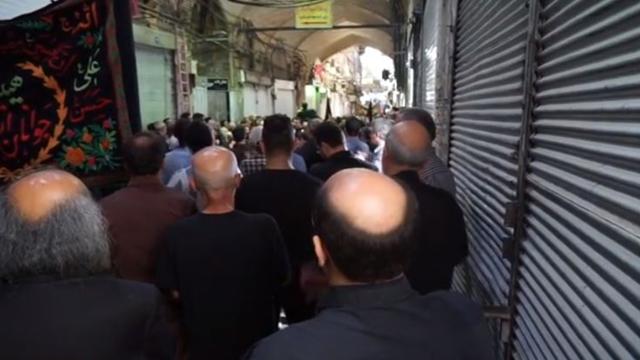The protests started out on April 16, over the high prices of Iran’s border customs tariff. Closing the borders in this area by Iran means that many Kurdish citizens lose their jobs, such as the porters (Kolbar).
In Marivan, the strike of merchants and shopkeepers spread to all major points of the city such as the main intersection, the Jomhouri Ave., the Shabrang intersection, shopping centres across the city and the Bazaar. The anti-riot guard forces attacked and beat the people in the Bissarani square.
The name Kolbar is used commonly amongst the people of these Kurdish cities, meaning to carry heavy items on your back crossing both sides of the border with Iraq to make some money in order to live.
The same form of labour is also carried out in other Provinces mentioning West Azerbaijan, Kurdistan, Kermanshah as well as Sistan and Baluchestan. For many, the reason for being a Kolbar is unemployment or just simply having no other choice.
Porters living conditions
According to the Iranian Law, crossing the border whether by person or working animals without paying border tax is smuggling. Kolbars carry TV, coolers, heaters, cigarettes, wheels and clothing. Being a porter is a dangerous job and mostly done by those near the borders. These porters are very young of age or in early adulthood. They have to continue this risky life in order to have something to eat. Almost every year thousands of porters die on the Iranian border.
Amongst the young workers are those who have gained high education rates but due to the unemployment crisis they have no other way of earning a living. Strikes in the cities of Baneh and Javanroud continue after two weeks. They want their jobs back and plan to take to the streets in protest to show their poor living conditions.
Can’t Iran’s wealth fulfil Kurds lives?
Iran has been known for its rich energy resources ever since 1913 and has always been one of the main oil exporters. Being situated in the midst of the Persian Gulf and the Caspian Sea, it holds a special international place. It is one of the rare countries that can extract both oil and gas from the Caspian Sea and export it independently and directly.
Though having all the natural resources and national wealth, 40% of the population in Iran are living below the poverty line. Living conditions worsen in Iran every day and corruption grows, yet the government tries to show that there is a way out of the current crisis. Nonetheless, the people of Iran are showing that their final saviour is a regime change.




